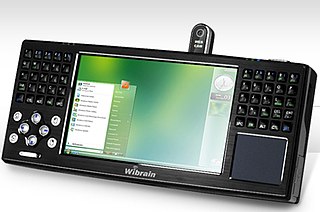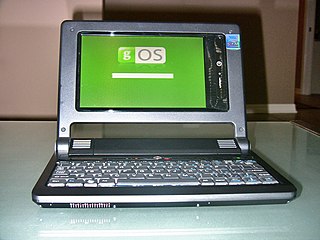VAIO is a brand of personal computers and consumer electronics, currently developed by Japanese manufacturer VAIO Corporation, headquartered in Azumino, Nagano Prefecture.
The PenPoint OS was one of the earliest operating systems written specifically for graphical tablets and personal digital assistants. It was a product of GO Corporation. PenPoint OS ran on a number of Intel x86-powered tablet PCs including IBM's ThinkPad 700T series, NCR's 3125, 3130 and some of GRiD Systems' pen-based portables; it was later ported to the Hobbit chip in AT&T Corporation's EO Personal Communicator. PenPoint was never widely adopted.

Lifebook is a line of laptop computers made by Fujitsu, which also offers a range of notebooks and tablet PCs within the same Lifebook family.

Mobile computing is human–computer interaction in which a computer is expected to be transported during normal usage and allow for transmission of data, which can include voice and video transmissions. Mobile computing involves mobile communication, mobile hardware, and mobile software. Communication issues include ad hoc networks and infrastructure networks as well as communication properties, protocols, data formats, and concrete technologies. Hardware includes mobile devices or device components. Mobile software deals with the characteristics and requirements of mobile applications.
OQO was a U.S. computer hardware company that was notable for manufacture of handheld computers. Its systems possessed the functionality of a tablet PC in a size slightly larger than a personal digital assistant (PDA). According to Guinness World Records, the "OQO" was the smallest full-powered, full-featured personal computer in 2005. The company's first version of subnotebook computer was the OQO model 01. It had been compared with the Ultra Mobile PC platform, although it was introduced before the UMPC took flight. The company was founded in 2000.

An interactive kiosk is a computer terminal featuring specialized hardware and software that provides access to information and applications for communication, commerce, entertainment, or education.
Archos is a French multinational electronics company that was established in 1988 by Henri Crohas. Archos manufactures tablets, smartphones, portable media players and portable data storage devices. The name is an anagram of Crohas' last name. Also, in Greek (-αρχος), it's a suffix used in nouns indicating a person with power. The company's slogan has been updated from "Think Smaller" to "On The Go", and the current "Entertainment your way".

Microsoft Corporation is a multinational corporation based in Redmond, Washington, USA and founded by Bill Gates and Paul Allen that develops, manufactures, licenses, and supports a wide range of products and services predominantly related to computing. Due to the scope and size of the company, it encompasses a broad range of topics mostly revolving around critical analysis and the company's products and services.

Subnotebook, also called ultraportable, superportable, or mini notebook, is a type of laptop computer that is smaller and lighter than a typical notebook-sized laptop.

A tablet computer, commonly shortened to tablet, is a mobile device, typically with a mobile operating system and touchscreen display processing circuitry, and a rechargeable battery in a single, thin and flat package. Tablets, being computers, have similar capabilities, but lack some input/output (I/O) abilities that others have. Modern tablets largely resemble modern smartphones, the only differences being that tablets are relatively larger than smartphones, with screens 7 inches (18 cm) or larger, measured diagonally, and may not support access to a cellular network. Unlike laptops, tablets usually run mobile operating systems, alongside smartphones.

An ultra-mobile PC, or ultra-mobile personal computer (UMPC), is a miniature version of a pen computer, a class of laptop whose specifications were launched by Microsoft and Intel in Spring 2006. Sony had already made a first attempt in this direction in 2004 with its Vaio U series, which was only sold in Asia. UMPCs are generally smaller than subnotebooks, have a TFT display measuring (diagonally) about 12.7 to 17.8 centimetres, are operated like tablet PCs using a touchscreen or a stylus, and can also have a physical keyboard. There is no clear boundary between subnotebooks and ultra-mobile PCs, but UMPCs commonly have major features not found in the common clamshell laptop design, such as small keys on either side of the screen, or a slide-out keyboard.

The Samsung Q1 was a family of ultra-mobile PCs produced by Samsung Electronics starting in 2007. They had a 7" (18 cm) LCD and were made in several different versions with either Windows XP Tablet PC Edition or Windows Vista Home Premium.

Motion Computing, Inc., was a developer of slate Tablet PC computers located in Austin, Texas. Motion Computing focused on vertical markets such as healthcare government, public safety, and construction. It was the first company to introduce Gorilla Glass, Bonded displays, built-in array microphones, and UV light-based disinfection stations for clinical environments.

A mobile Internet device (MID) is a multimedia capable mobile device providing wireless Internet access. They are designed to provide entertainment, information and location-based services for personal or business use. They allow 2-way communication and real-time sharing. They have been described as filling a niche between smartphones and tablet computers.

The CloudBook is a discontinued x86 subnotebook, or Ultra-Mobile PC developed by Everex using a VIA processor, chipset, and NanoBook reference design. It competed with the Asus Eee PC, the OLPC XO-1 and the Classmate PC. The device was categorized as a netbook when it was around 2008.
Nokia Internet Tablets is the name given to a range of Nokia mobile Internet appliances products. These tablets fall in the range between a personal digital assistant (PDA) and an Ultra-Mobile PC (UMPC), and slightly below Intel's Mobile Internet device (MID).
This is a list of tablet computers, grouped by intended audience and form factor.
The history of tablet computers and the associated special operating software is an example of pen computing technology, and thus the development of tablets has deep historical roots. The first patent for a system that recognized handwritten characters by analyzing the handwriting motion was granted in 1914. The first publicly demonstrated system using a tablet and handwriting recognition instead of a keyboard for working with a modern digital computer dates to 1956.

Microsoft Tablet PC is a term coined by Microsoft for tablet computers conforming to hardware specifications, devised by Microsoft, and announced in 2001 for a pen-enabled personal computer and running a licensed copy of the Windows XP Tablet PC Edition operating system or a derivative thereof.











